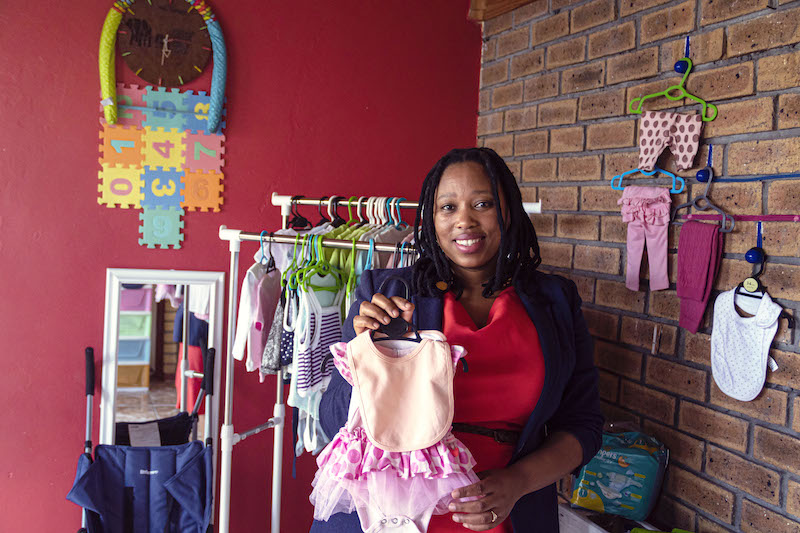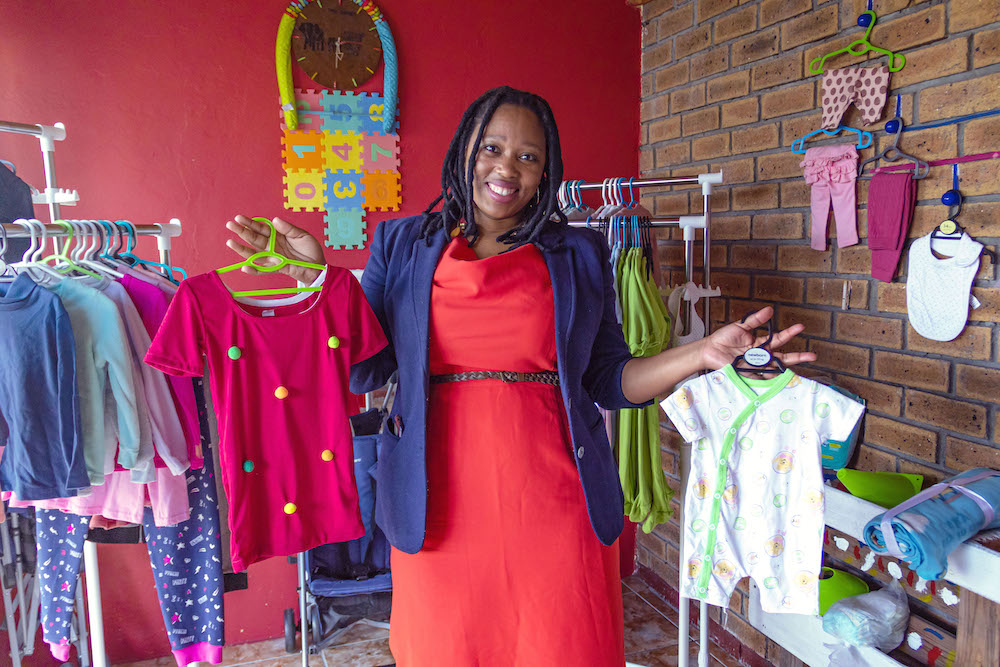Zandile Tlhapi is an inspirational small business pioneer in Khayelitsha, Cape Town: her shop, Baby Friendly, is the proud first of its kind, founded and staffed from within the community. Not only is she an altruistic entrepreneur, committed wife and mother of two, poet, artist, and gifted songbird – but she is also a qualified boiler-maker with an affinity for power tools, and a flair for hardcore industrial welding! We simply had to know more: she exudes tenacity and dynamism, as she shared her incredible story with us.
From boilermaker to starting her business
Growing up, Zandile was talented and free-spirited, with immense natural, creative flair: she loved music, dance and literature, but also excelled in basketball (eventually playing at provincial level). However, she didn’t have a lot of confidence in her academic abilities, and didn’t know what she wanted to do after leaving school. Little did she know that it was precisely her lack of a defined plan, her openness to new experiences and zeal to keep learning, that would take her exactly where she was supposed to go.
Zandile was always interested in studying a trade, she says “I’m a very self motivated person, so I got myself into a boiler-making apprenticeship – but at the time, I had no idea what that even was!” She laughs, “Thankfully, it was so much fun: I loved welding, and in the end I was literally making the steel structures for massive boats from scratch, so I’m proud of that.” But, she grew tired of working in an industry that treated women poorly, and got accepted to UWC to study project management. However, when she attained her qualifications, she couldn’t bring herself to keep working for someone else – she needed to be free.
I thought to myself: it’s about time that I work my butt off for something that belongs to me, to my community, and that will inspire other people. That’s me, I love encouraging people in whichever way I can - if it’s with my words, my poems or a song.
Zandile wanted to start a business involving baby products and services, because she knew firsthand what a struggle it was for mothers in Khayelitsha to get the things they really needed – that were good quality yet affordable, and didn’t require them to incur the hassle, cost and security risks of traveling into the city. She says, “In the townships, we have to go far to get everything outside of our neighborhood – from work, to food and clothes. So I started a very basic shop with clothing and toys, that was convenient and safe for local moms.”
“At this point, I just wanted to start – I didn’t care what I started with, I just needed to start!”

Getting funding and support
Next, through sheer determination and without any formal business training, she managed to get seed funding from the NYDA, after a gruelling application process. “People told me a baby shop in Khayelitsha would never work, but the community is behind me now. That pushed me to do it even more.” So, with bare minimum funding, she hustled to get involved with the The Clothing Bank – where basic business training is offered, as well as special deals on clothes for resale. But, despite the incredible value she was getting from their financial education initiative, she struggled to find the baby outfits and accessories she knew her customer-base was looking for – she realised that the answer was to start producing what she wanted, herself.
What I’ve learned is that you really need to drive yourself to where you want to be - one step at a time, one moment at a time, one contact at a time.
Plans for a factory
So, tapping into her own radical resourcefulness once again, she’s now planning to start a factory in her own garage. She says, “The beautiful thing about the factory is that, there are lots of women living in my area who got retrenched from big clothing manufacturers, and they have so much experience – sometimes over 30 years. They came to our space, we got two second-hand sewing machines and started with simple things like bibs, blankets and newborn onesies. The opportunities are there, we just need to start! The factory will solve so many problems for me, but mainly also for the community – it’s so amazing and so humbling.”
Instead of looking for external investment, Zandile has decided to fund the next phase of her business strategy through donations on her crowd-sourcing page, in order to retain full autonomy and ownership of her work. “My grandpa is helping me set up the factory and we’ll slowly look for pre-owned machines and tools where we can. I don’t want investors, we are starting from nowhere and we want to go somewhere – we don’t mind working very hard, but we have to have something that is our own at the end of the day. I have always been different. I choose to go my own way.”
Pitching herself into the future
Zandile recently won the provincial round of the Engen Pitch and Polish entrepreneurial competition, and is on her way to the national finals in September. Her ideas are justly being recognised and celebrated: fresh and ambitious, while still practical and business savvy – not to mention her project’s impressive upliftment ramifications.
When asked about her plans for Baby Friendly’s future, she practically bubbles over with excitement, “The most beautiful part – which I can’t wait for – is the skills transfer program that is going to be birthed from the factory: the older women, with a wealth of expertise, will teach the young people to sew and produce beautiful things with their hands. We are also going to involve life coaches and mentors, because our youth are so uninspired and discouraged – we need to build our confidence from within, as a community.”
She is also using her influence and growing network to actively seek out opportunities to add even more value: not only does Zandile run donation-drives to help babies and young families affected by shack fires in Khayelitsha, but she is collaborating with the Cape Town Society for the Blind to develop a range of products and clothes that use braille, and designs more suited to the practical needs of local blind parents.
“I would love to open more stores one day, but only in different townships. Self reliance starts with us, and it really has to be practiced – that’s where I want to start. ”



